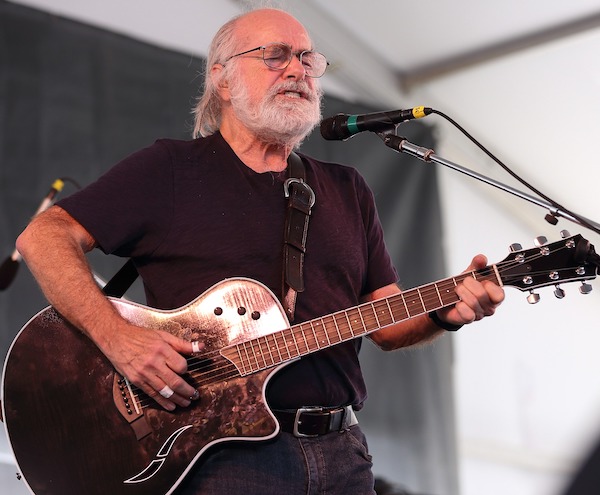Arts Remembrance: Robert Hunter, Lyricist for the Grateful Dead
By Scott McLennan
Besides providing indelible images and graceful poetry to the music of the Grateful Dead, Robert Hunter produced a mountain of work as a solo artist, as a collaborator with Bob Dylan, and as a prized writing partner for many others.

Robert Hunter at the 2014 Newport Folk Festival. Photo: Rich Gastwirt.
I’m not particularly religious, but I do believe in conversions.
In my case—and I’m sure I’m not alone here – there was Life Before Grateful Dead and then Life After Grateful Dead.
In the “before” existence, I was perfectly happy getting my teenage kicks to the rock ‘n’ roll of the day, be it Elton John tunes that a friend’s older sister turned us on to, or the expansive sounds of ELO, or the omnipresent Peter Frampton, or the frolicking Fleetwood Mac. If we wanted to get sleazy, we had Kiss.
I stumbled onto the Grateful Dead thanks to a summer camp counselor who played the song “Casey Jones” on a mix tape—probably eight-track, given the time frame— over and over. It got in my head.
Trains. Cocaine. Trouble ahead. The spiraling guitar riffs. The kinda-folksy, kinda-rocking sound. This is different. I thought. This is weird. I like it.
I had no idea what I was getting into.
By the time I saw my first Grateful Dead concert in 1979 I had already amassed a bunch of the band’s records and studied them like scripture. Seeing the band live pulled me into a community that I am still active in.
Robert Hunter’s lyrics had a lot to do with this conversion.
Hunter died on September 23 at the age of 78. Besides providing indelible images and graceful poetry to the music of the Grateful Dead, he produced a mountain of work as a solo artist, as a collaborator with Bob Dylan, and as a prized writing partner for Jim Lauderdale, Bruce Hornsby, Elvis Costello, and the bands Zero, Los Lobos, and Little Feat, plus many of the Grateful Dead members’ offshoot bands.
In the week since Hunter’s passing, I’ve been listening to a lot of his work, sad that he is gone, thankful that I found him.
As tribute after tribute has pointed out, Hunter did as much to shape the sound and influence of the Grateful Dead as guitarist Jerry Garcia did.
Focusing on Hunter alone, he imbued the Dead’s songs with philosophical musings and meticulously drawn vignettes. He worked through a broad and dynamic emotional range that took measure of the virtuous and the damned: One man gathers what another man spills; Every silver lining has a touch of grey; Sometimes the light’s all shining on me, other times I can barely see.
For me, Hunter helped get me adjusted to the idea that nothing’s for certain and it could always go wrong. Not that his work is pessimistic, but it reflects on the sorrows we are all bound to confront — and how to work through them. He did not fall back on the romantic rock ‘n’ roll trope of miraculously transforming hardship into triumph. His words inspired me to find the love that will fill the empty cup, to look for the thing that is built to last. I came to learn that you hold on to that stuff. You share that stuff.
Hunter seemed to enjoy making you think, not making you comfortable, which is ultimately what made him an artist and not an entertainer. That’s not to say he could not be entertaining; Hunter had plenty of freewheeling bits, from the life-as-a-card-game metaphor of “Deal” to the freak anthem “U.S. Blues.”
But Hunter leavened our cultural bacchanalia with plenty of serious considerations, such as the lurking dread of “Dire Wolf,” the skid row existence laid out in “Wharf Rat,” and the dark pall cast over “Black Peter.”
This was rock ‘n’ roll operating at a whole different level.
Hunter’s work, particularly with the Grateful Dead, tempts, celebrates and examines the life lived off the safe and predictable path. Making use of a literary strategy that fused myth, history, imagination, and allegory, Hunter made it clear that there is so much to see, to learn, and to explore that accepting the boundaries set by the powers-that-be is tragic. It means missing out on a transient nightfall of diamonds, or the leaf of all colors playing the golden-string fiddle, or the fountain that was not made by the hands of man.
Hunter’s lyrics inspired and provoked, while leaving lots of room for interpretation. More than 40 years after first hearing Hunter lyrics, I still find something fresh in them. Not every song, every time. But frequently enough so that I’m not going back to these tunes just for the sake of their comforting familiarity, but because they help me make sense of—or at least deal with—day-to-day realities, from the deeply personal to the broadly communal.
Hunter, of course, hasn’t told any of us Deadheads what to think or how to think. He would likely be horrified if he thought that were the case. The point is made in a verse from his masterwork, “Terrapin Station:” The storyteller makes no choice/ soon you will not hear his voice/ his job is to shed light/and not to master.”
But thank you Robert Hunter for lighting the song with sense and color, holding away despair.
Scott McLennan covered music for the Worcester Telegram & Gazette from 1993 to 2008. He then contributed music reviews and features to The Boston Globe, The Providence Journal, The Portland Press Herald and WGBH, as well as to the Arts Fuse. He also operated the NE Metal blog to provide in-depth coverage of the region’s heavy metal scene.
